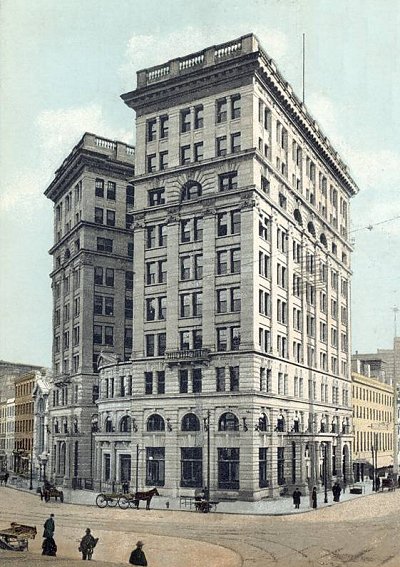|
Onondaga Bank |
|
|
Southeast corner of Salina and Erie |
|
| Onondaga County Savings Bank was first incorporated on April 10, 1855.
Its original offices were two blocks north of the current location, at the
middle of 100 South Salina block. The bank's second location was in the old Syracuse House which once stood where the bank is today. The third location was the building now known as the Gridley Building, across the street from the current location. The bank's fourth and final home was this 10 story "skyscraper," as it called when completed in 1897. (Onondaga Bank was purchased by M&T Bank in 1996). The building was remodeled in 1931, adding murals and ceiling artwork by William T. Schwarz, whose father was president of the Bank from 1927 to 1931. The ceiling painting is an astrologically correct representation of the night sky, depicting the signs of the Zodiac. It is a replica of a map found by Schwarz in the Library of Congress, drawn by a 15th century astronomer. This, in turn, was copied from an Italian monastery. To maintain accuracy, the layout was overseen by a professor of astronomy at Haverford College in Pennsylvania. The artist claimed the location of the stars was so precise, "You can even use a sextant on it." |
|
|
Shying away from conventional materials, Schwarz used blox Belgium paint containing Ferrara marble dust instead of white lead to prevent cracking and darkening of colors. The paint was applied to a fabric made of linen and jute. The resulting canvas, in two sections, weighed more than a ton. Installing it to the ceiling was an engineering feat in itself. The mural was placed face down on the lobby floor on top of a circus net borrowed from the famous Ringling family of Sarasota, Florida. The ceiling was coated with white lead and varnish. Then, using block and tackle, the mural and net were raised to within an inch of the ceiling. From there the mural was rolled into place. Fearing that the painting might not adhere properly, the net was left in place overnight. The painting hasn't moved since. |
|
|
The murals on the walls depict historical highlights of the community.
|
|
